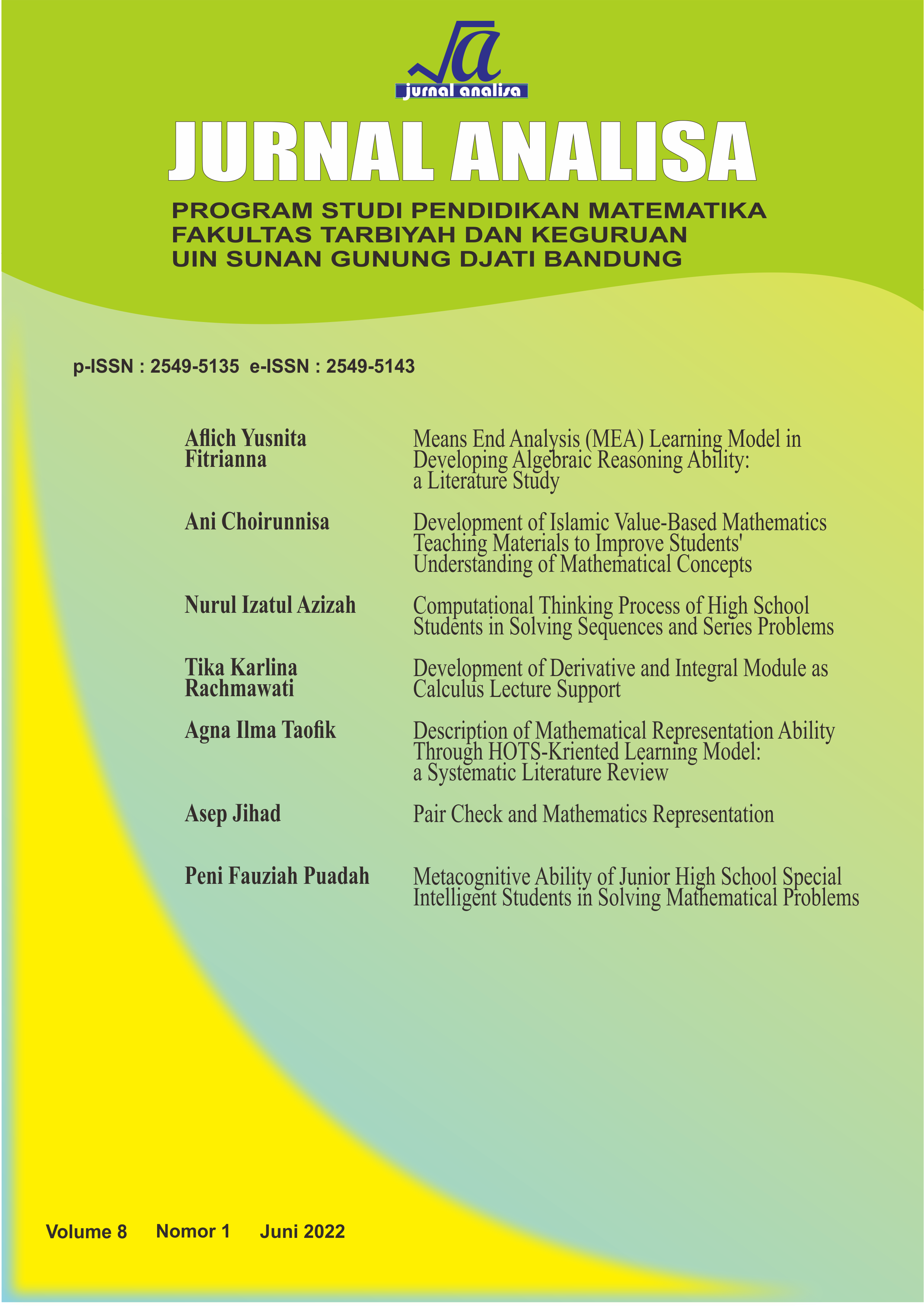Development of Derivative and Integral Module as Calculus Lecture Support
DOI:
https://doi.org/10.15575/ja.v8i1.15365Keywords:
Module Development, Validity, Practicality, EffectivenessAbstract
Penelitian ini bertujuan untuk mengetahui pengembangan modul materi Turunan dan Integral ditinjau dari tingkat validitas, kepraktisan, efektivitas modul sebagai penunjang perkuliahan mahasiswa prodi Pendidikan Matematika yang dinilai oleh ahli materi dan ahli media serta perbedaan peningkatan kemampuan pemecahan masalah matematis antara kelas yang menggunakan modul Turunan dan Integral dengan kelas yang tidak menggunakan modul Turunan dan Integral. Pengembangan modul Turunan dan Integral yang diperuntukkan untuk mahasiswa prodi Pendidikan Matematika dilakukan melalui beberapa tahap dalam model Research and Development (RnD) yang meliputi research and information collecting, planning, develop preliminary form of product, preliminary field testing, main product revision, main field testing, operational product revision, operational field testing, final product revision, dissemination and implementation. Hasil pengembangan modul Turunan dan Integral menunjukkan valid, praktis dan efektif sehingga layak digunakan pada pembelajaran Kalkulus.
Â
Â
The purpose of this study was determine the development of the Derivative and Integral material module in terms of the level of validity, practicality, and effectiveness of the module as a lecture support for students of the Mathematics Education study program assessed by material experts and media experts as well as differences in increasing mathematical problem solving abilities between classes using module Derivatives and Integrals with classes that do not use the Derivatives and Integral modules. The development of the Derivative and Integral module which is intended for students of the Mathematics Education study program is carried out through several stages in the Research and Development (RnD) model which includes research and information collecting, planning, develop preliminary form of product, preliminary field testing, main product revision, main field testing, operational product revision, operational field testing, final product revision, dissemination and implementation. The results of the development of the Derivative and Integral module show that this module is valid, practical and effective so that it is suitable for use in Calculus learning.
References
Anderson, J. (2009). Mathematics Curriculum Development and the Role of Problem Solving. In ACSA Conference, 1–8. https://doi.org/10.1007/s41297-020-00107-3
Borg, W. ., & Gall, M. . (1983). Educational Research an Introduction fourth edition. Longman Inc, 1(1).
Branca, N. A. (1980). Problem Solving as a Goal, Process and Basic Skill. In NCTM.
Chandra, R. (2018). Pascal Programming Module Development In Mathematics Education Courses. Journal of Residu, 2(3), 55–66.
Depdiknas. (2008). Teknik Penyusunan Modul, Direktorat Jendaral Manajemen Pendidikan Dasar dan Menengah. In Departemen Pendidikan Nasional.
Direktorat Jendral Pengembangan Mutu Pendidikan dan Tenaga Pendidikan. (2008). Penulisan Modul. In Departemen Pendidikan Nasional. https://doi.org/10.21009/aksis.020108
Firmansyah, R. S., & Rusimamto, P. W. (2020). Kepraktisan Modul Pembelajaran Human Machine Interface Pada Mata Pelajaran Instalasi Motor Listrik Di Smk Negeri 3 Jombang. Jurnal Pendidikan, 9, 395–403. https://jurnalmahasiswa.unesa.ac.id/index.php/jurnal-pendidikan-teknik-elektro/article/view/34784
Hitier, M., & González-MartÃn, A. S. (2022). Derivatives and the Study of Motion at the Intersection of Calculus and Mechanics: a Praxeological Analysis of Practices at the College Level. International Journal of Research in Undergraduate Mathematics Education, 1-25.
Nengsih, L. W., Susiswo, S., & Sa’dijah, C. (2019). Kemampuan Pemecahan Masalah Matematika Siswa Sekolah Dasar dengan Gaya Kognitif Field Dependent. Jurnal Pendidikan: Teori, Penelitian, Dan Pengembangan, 4(2), 143–148. https://doi.org/10.17977/jptpp.v4i2.11927
Nuryadi, N., & Khuzaini, N. (2017). Keefektifan Media Matematika Virtual Berbasis Teams Game Tournament Ditinjau Dari Cognitive Load Theory. Jurnal Mercumatika : Jurnal Penelitian Matematika Dan Pendidikan Matematika, 2(1), 57–68. https://doi.org/10.26486/jm.v2i2.370
Puspitasari, A. D. (2019). Penerapan Media Pembelajaran Fisika Menggunakan Modul Cetak dan Modul Elektronik pada Siswa SMA. Jurnal Pendidikan Fisika, 7(1), 17–25.
Sugiyono. (2010). Metode Penelitian Pendidikan Pendekatan Kulitatif, Kuantitatif dan R&D. Alfabeta.
Turmuzi, M., Dasing, A. S. H., Baidowi, & Junaidi. (2021). Analisis Kesulitan Belajar Mahasiswa Secara Online (E-Learning) Selama Masa Pandemi Covid-19. Edukatif : Jurnal Ilmu Pendidikan, 3(3), 900–910.
Ulya, R., & Hidayah, I. (2016). Kemampuan Pemecahan Masalah Ditinjau dari Self-Efficacy Siswa dalam Model Pembelajaran Missouri Mathematics Project. UJMER:Unnes Journal of Mathematics Education Research, 5(2), 178–183.
Walid, Ahmad, D. (2019). Pembelajaran Biologi Menggunakan Problem Solving Disertai Diagram Tree Untuk Memberdayakan Tree Diagram To Empower Logical Thinking and. Indonesian Journal of Integrated Science Education ( IJIS Edu ), 1(1), 1–6.
Downloads
Published
Issue
Section
License
Authors who publish in Jurnal Analisa agree to the following terms:
1. Authors retain copyright and grant the journal right of first publication with the work simultaneously licensed under a Attribution-ShareAlike 4.0 International (CC BY-SA 4.0) License that allows others to share the work with an acknowledgment of the work's authorship and initial publication in this journal.
2. Authors are able to enter into separate, additional contractual arrangements for the non-exclusive distribution of the journal's published version of the work (e.g., post it to an institutional repository or publish it in a book), with an acknowledgment of its initial publication in this journal.
3.Authors are permitted and encouraged to post their work online (e.g., in institutional repositories or on their website) prior to and during the submission process, as it can lead to productive exchanges, as well as earlier and greater citation of published work (See The Effect of Open Access).
